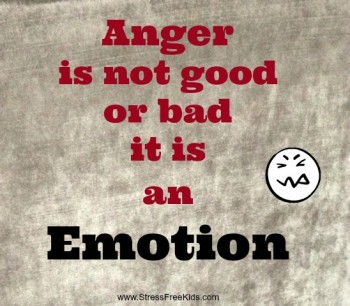Note to Readers: As a parent, dealing with an angry child is inevitable and feared by all. Many of us have heard our own pre-parenting voice whisper to us….”That will never be my kid having a fit like that!” (Famous last words) Many adults do not handle anger in a healthy manner because they were not given the skills as a child to express anger in a healthy way. Breathing and visualizing putting anger into bubbles is one of my favorite ways to rid our bodies of anger. Elizabeth shares her experience and empowering anger management tips for you and your children.
by Elizabeth O’Shea
Just like adults, children get angry. And due to their inexperience they don’t have the experience or self-control to know how to deal with it. By our actions we help our little ones learn how to deal with frustrations. If they live in a household where shouting and hitting are acceptable they will copy this behaviour from the adults around them. The important message we need to give to our children is:
It is OK to be angry, but not to hurt people or property
So how do we teach our children acceptable ways of expressing anger?
- By modeling what we want them to do –such as taking time out when we are angry, asking assertively for what we want and by finding an appropriate outlet for our physical energy
- Find an object that helps your child calm down. Some children will be comforted by a blanket, special soft toy, or soft cushion.
- By having an area or corner where they can go when they feel angry – and have materials to draw an angry picture, rip up newspaper, bubble wrap to stamp on, a punch ball or pillow to punch, or a mini trampoline to jump on.
Although some of these are not ‘adult’ ways of behaving, it can help if a child can make small steps towards dealing with their anger until they are mature enough to try different strategies.
- Ways of getting rid of pent-up angry energy can be running up and down the garden ten times or running up and down the stairs twenty times. A drum kit in the garage can also be very therapeutic!
- Taking time out – both for adults and children can be a useful strategy.
- Some parents find holding their child firmly helps the child feel safe when they are angry. But do this with caution – an angry child can be quite violent, and some children may feel that physical restraint is a punishment and kick against you.
- Older children may find that retreating to a quiet room helped. Maybe reading a book to take their mind off the situation. Or listening to a relaxation CD.
- Listening to high-energy music may be useful. My youngest daughter used to dance vigorously to Billy Elliott’s ‘Angry Dance’.
- Playing with a pet, especially a dog, can help as children feel their pets are accepting. But don’t suggest this strategy if your child may hurt their pet.
- Older children may find writing a letter is useful, although it may be best not to send it if it was written in the heat of the moment. Ceremonially setting fire to it in a baking tray can be quite satisfying.
- Teach them to explain how they feel assertively. Get them to fill in the blanks in the sentence ‘I feel….when…. because….and I want…..’
- You can also ask your child what they find helps when they feel angry – If you give them time to think they may be able to suggest some great strategies of their own that work for them.
And finally when they are angry about a situation teach children to problem solve. Sit down and get them to write down a whole load of potential solutions to their problem. Add solutions of your own at the end and get them to choose which solution they want to try.
Elizabeth is a parenting specialist in the UK and runs a variety of parenting courses in West Sussex and London. She lives in Horsham with her husband and four children. She wants to help parents raise children with confidence, self-reliance, self-esteem and who can achieve their full potential. She teaches very practical skills to encourage cooperation, ensure good relationships between parent and child and manage challenging behaviour.
E-mail [email protected]
Visit www.parent4success.com to download my free e-book ’20 top tips for parents’
Follow me on Facebook: www.facebook.com/Parent4SuccessCourses
Follow me on twitter: www.twitter/parent4success
Angry Octopus is an anger management story available as a book, lesson plan, audio CD, and animated app.